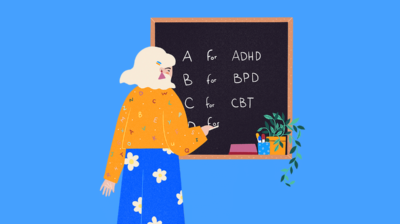How DBT helped my mental health journey
Maria outlines how she has used the basics of DBT when she gets overwhelmed.

I am a very anxious person. Here is a mindful coping strategy that I learned through Dialectical Behavioural Therapy (DBT), that I like to remind myself of when I get overwhelmed.
DBT focuses on four main concepts:
- Mindfulness – being fully aware in the moment
- Interpersonal problem-solving – how to deal with interpersonal conflict and ask for what you need
- Distress tolerance – how to tolerate difficult situations
- Emotion regulation – how to tolerate and change emotions.
DBT also includes three components: group therapy/skill training sessions, individual psychotherapy sessions, and phone coaching (where clients are able to call their therapists during difficult times when they need help).
Mastering mindfulness starts with the “WHAT” skills – Observe, Describe and Participate.
Observe
I notice my environment in the present moment. I do this by listing 5 things I can see, touch or smell or just by focusing on my breathing.
I watch my thoughts and feelings come and go as if they were on a conveyor belt. I do not push anything away. I open myself to all feelings, thoughts, and observations as they come and go. I do not put a label or judgement on my observations.
Describing my experience
For example, “I feel tired”. I try to break big emotions into simpler terms like “sad” + “ fear” = “grief”.
Once again, I don’t judge what I am describing.
Participate
I throw myself into the present moment.
I do this by cleaning, dancing, running, feeling sad in the moment, etc.
I fully experience my feelings without being self-critical. I decide if I need to focus on something else to avoid my feelings or just to feel what I feel in that moment.
I use my “HOW” skills while participating.
The “HOW” skills are don’t judge, focus, do what works.
Don’t judge
I notice, but don’t evaluate things as good/bad. I don’t judge my judgement. I can’t go through life without making judgements; my goal is to catch them so I can have control over my emotions. Here is an example: “Sadness is an emotion. It is neutral. The fact that I’m sad does not make me a bad person. Experiencing an emotion is neither a good or a bad thing. It simply is. It’s okay to feel sad”.
Focus
I concentrate my mind and do one thing at a time. A great start is eating without any distractions. I try not to multitask.
Do what works
I focus on doing what works, rather than what is right/wrong or fair/unfair. I play by the rules and act as skilfully as I can. I don’t have to like the situation or agree with the other person. Even if I am right and they’re wrong, it may be for the best for me to let it go.
This ties in with something called Radical Acceptance, which is being OK with things as they are that I cannot change.
These skills can be hard to master and take time, but are definitely worth it in the end. Actively being in the moment can help avoid obsessing over the past, worrying about the future, or responding negatively to a stressful situation.
Feeling overwhelmed and want to talk to someone?
- Get anonymous support 24/7 with our text message support service
- Connect with a trained volunteer who will listen to you, and help you to move forward feeling better
- Whatsapp us now or free-text SPUNOUT to 50808 to begin.
- Find out more about our text message support service
If you are a customer of the 48 or An Post network or cannot get through using the ‘50808’ short code please text HELLO to 086 1800 280 (standard message rates may apply). Some smaller networks do not support short codes like ‘50808’.






